Posted November 2, 2023 by Nicky in Reviews / 0 Comments

The Paddington Mystery
Genres: Crime,
Mystery Pages: 187
Rating: 
Synopsis: When Harold Merefield returns home from a nightclub in the early hours, he is startled by the gruesome discovery of a corpse - on his own bed! Who is he, and how did he get there?
Unconvinced by the inquest's verdict of 'death from natural causes', Harold determines to investigate the matter for himself and seeks the help of Professor Priestly, an academic with a reputation for solving curious affairs by the simple but unusual method of logical reasoning...
Apparently this is one of the first of John Rhode’s mysteries, so I was pretty intrigued: I’ve enjoyed his work, especially as Miles Burton, in a very classic mystery sort of way — perhaps not too enlightening about characters or even places, but a fun puzzle, and a satisfying sense of the world being put more or less to rights.
This book has those things, with actually a reasonable amount of character: Harold’s a bit of a mess, but cleaning his act up, and the Professor comes across quite sympathetically given that his daughter is tangentially involved in the mystery. I remember I’ve read one of the others starring Priestly, but couldn’t remember a single detail about him: this is a bit more memorable.
The mystery wasn’t too surprising, and I figured out some chunks of it quite quickly, but it was still satisfying to unravel and to see how Priestly gets things straightened out. I enjoyed it.
Rating: 3/5
Tags: book reviews, books, crime, John Rhode, mystery
Posted November 1, 2023 by Nicky in Reviews / 1 Comment
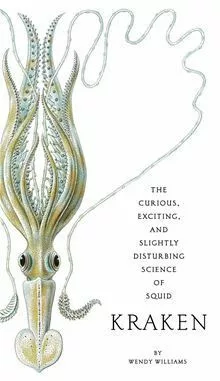
Kraken: The Curious, Exciting, and Slightly Disturbing Science of Squid
Genres: Non-fiction,
Science Pages: 223
Rating: 
Synopsis: Kraken is the traditional name for gigantic sea monsters, and this book introduces one of the most charismatic, enigmatic, and curious inhabitants of the sea: the squid. The pages take the reader on a wild narrative ride through the world of squid science and adventure, along the way addressing some riddles about what intelligence is, and what monsters lie in the deep. In addition to squid, both giant and otherwise, Kraken examines other equally enthralling cephalopods, including the octopus and the cuttlefish, and explores their otherworldly abilities, such as camouflage and bioluminescence.
Kraken was okay, but I felt the lack of numbered footnotes and felt it was all pretty slight, relying on personal interview and recounting of encounters between people and squid, rather than focusing on squid directly. There are endnotes with a few pages of sources, but it’s impossible to match up anything said in a specific chapter with the sources, which are just alphabetised.
It’s pretty readable, and there are some interesting anecdotes, but it feels like the author didn’t really had enough material — even padding out the book with a chapter on octopodes, instead of staying focused on squid. (Of course they are related, but the chapter wasn’t about the similarities/differences so much, just spent time describing a specific encounter with an octopus and such.)
So overall, it was okay, and there was some new-to-me information, but… ultimately, nothing too surprising, and no moments where I wanted to turn to someone and say “hey, did you know…?”
Rating: 2/5
Tags: book reviews, books, non-fiction, science, Wendy Williams
Posted October 31, 2023 by Nicky in Reviews / 0 Comments
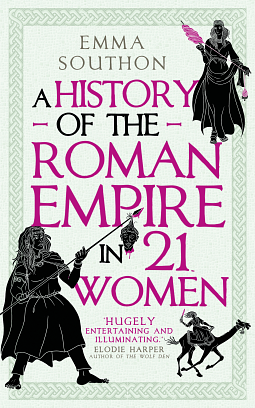
A History of the Roman Empire in 21 Women
Genres: History,
Non-fiction Pages: 336
Rating: 
Synopsis: Here’s how the history of the Roman Empire usually goes… We start with Romulus, go on to Brutus overthrowing Tarquin, bounce through an appallingly tedious list of battles and generals and consuls, before emerging into the political stab-fest of the late Republic. From there, it runs through all the emperors, occasionally mentioning a wife or mother to show how bad things get when women get out of control, until Constantine invents Christianity and then Attila the Hun comes and ruins everything. But the history of Rome and empire is so much more than these Important Things.
In this alternative history, Emma Southon traces the story of the Roman Empire through women: Vestal Virgins and sex workers, business owners and poets, martyrs and saints. Each gives a different perspective on women’s lives and how they changed, across time and across class lines.
Received to review via Netgalley
Emma Southon has a particular style that I imagine some people really hate: conversational, chatty, often even flippant. When she doesn’t know something, because no one knows, she says so. When she’s painting a picture from imagination to fill in the gaps, or choosing one interpretation of many, she says so very frankly. I find it very readable, and I appreciate how clear she is about when she’s using sources, how she’s using sources, and when she’s just having to make things up — or choose one option above others because there’s nothing particular to tell them apart. She’s interested in telling a story here, and it shows.
That said, I can understand why those who are just looking for facts would rather she stop it; for all that she’s clear about sources vs imagination, it’s really not formalised. Don’t let that fool you, though: there’s an extensive bibliography at the back.
I really liked Southon’s plan to discuss events through women: I was kind of surprised Livia wasn’t a choice, for example, or Cleopatra, or Agrippina (who Southon has written a whole biography of!) — but instead Southon makes a harder decision, and often picks less well-known women.
I found it really enjoyable, though I still prefer her book on murder in Ancient Rome.
Rating: 4/5
Tags: book reviews, books, Emma Southon, history, non-fiction
Posted October 30, 2023 by Nicky in Reviews / 0 Comments

Post After Post-Mortem
Genres: Crime,
Mystery Pages: 300
Series: British Library Crime Classics Rating: 
Synopsis: The Surrays and their five children form a prolific writing machine, with scores of treatises, reviews and crime thrillers published under their family name. Following a rare convergence of the whole household at their Oxfordshire home, Ruth – middle sister who writes ‘books which are just books’ – decides to spend some weeks there recovering from the pressures of the writing life while the rest of the brood scatter to the winds again. Their next return is heralded by the tragic news that Ruth has taken her life after an evening at the Surrays’ hosting a set of publishers and writers, one of whom is named as Ruth’s literary executor in the will she left behind.
Despite some suspicions from the family, the verdict at the inquest is suicide – but when Ruth’s brother Richard receives a letter from the deceased which was delayed in the post, he enlists the help of CID Robert Macdonald to investigate what could only be an ingeniously planned murder.
I normally love E.C.R. Lorac’s books, and I think this was a very fine example of her work… without being one that I, strictly speaking, enjoyed. She has a way of describing characters and places that can make you love them and feel their goodness — and in this book, the nastiness of murder feels particularly prominent. It’s less “good people overcome” and more “good people are overcome”, and it just hit wrong for my current mood, despite being well handled.
Those who read it should be warned that the setup has the murder being taken to be suicide at first, and that the family react accordingly, with shock and horror and the sense that the world is upended. And that isn’t the end to their sorrows.
It’s a good thing that Lorac writes such a sensitive, humane detective in MacDonald, because his sympathy also helped to make this book as powerful as it is.
In the end, the solution was also a sad one, and the whole thing just left me with a sense of melancholy. Beautifully written, perhaps among Lorac’s best — but perhaps not one that I’ll visit again.
Rating: 4/5
Tags: book reviews, books, British Library Crime Classics, crime, E.C.R. Lorac, mystery
Posted October 29, 2023 by Nicky in Reviews / 0 Comments
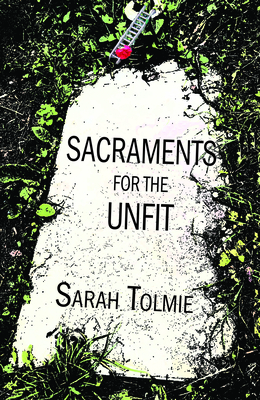
Sacraments for the Unfit
Genres: Fantasy,
Short Stories Pages: 146
Rating: 
Synopsis: The isolation of the COVID-19 pandemic brought out the ritualist in many of us. In this collection of contemporary weird short fiction, a variety of different persons and beings try to fill up their days in varying states of isolation and mystery, real or imaginary. An angel outlives the Apparat that used to employ him; a deity complains about no longer feeling seen; a museum curator living alone begins to inexplicably alter; a medievalist suffering from vision loss gets into a strange relationship with the ghost of the codicologist M. R. James; enigmatic objects begin to work themselves out of the ground by the grave of the philosopher Ludwig Wittgenstein, prompting scholarly speculation. Sacraments For the Unfit is a series of vignettes about the transformations that can happen while staying in place.
I can see why this book has been compared with Ursula Le Guin’s work. It had the same quality I have with some of her more impenetrable stories where I just don’t quite “get it”. Some of them seem to require some outside knowledge for more clarity — a little knowledge of M.R. James wouldn’t hurt, or Wittgenstein, which is quite the ask (I know a little about James, almost nothing about Wittgenstein).
In the end I don’t regret reading it, but also it wasn’t quite 100% squarely my thing, if that makes sense. I’m eager to read more of Tolmie’s books and stories, though: I really liked The Fourth Island and All the Horses of Iceland.
Rating: 3/5
Tags: book reviews, books, Sarah Tolmie, SF/F, short stories
Posted October 28, 2023 by Nicky in Reviews / 0 Comments
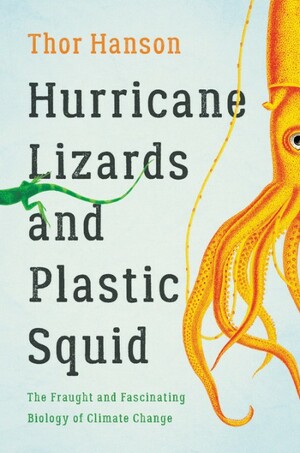
Hurricane Lizards and Plastic Squid
Genres: Non-fiction,
Science Pages: 304
Rating: 
Synopsis: In Hurricane Lizards and Plastic Squid, biologist Thor Hanson tells the remarkable story of how plants and animals are responding to climate change: adjusting, evolving, and sometimes dying out. Anole lizards have grown larger toe pads, to grip more tightly in frequent hurricanes. Warm waters cause the development of Humboldt squid to alter so dramatically that fishermen mistake them for different species. Brown pelicans move north, and long-spined sea urchins south, to find cooler homes. And when coral reefs sicken, they leave no territory worth fighting for, so aggressive butterfly fish transform instantly into pacifists.
A story of hope, resilience, and risk, Hurricane Lizards and Plastic Squid is natural history for readers of Bernd Heinrich, Robin Wall Kimmerer, and David Haskell. It is also a reminder of how unpredictable climate change is as it interacts with the messy lattice of life.
I found this surprisingly optimistic, given that the topic is the way animals and plants are adapting to changing climates and ecosystem upheaval. Hanson presents a fairly hopeful picture, though he tries repeatedly to temper the hope with reality — the refugia that allow species to survive in tiny slices of microclimate aren’t going to save species forever, and even those species which can move to a new place are causing immense disruption wherever they arrive.
I still fear that people will read this and come away with the feeling that everything will, somehow, be fine, because species are extraordinarily resilient and changeable. But as Hanson takes some pains to point out, that’s only some species. The examples he gives are just a handful.
It’s a very readable book, and fascinating: it ranges through a number of very different habitats, making its points.
Rating: 4/5
Tags: book reviews, books, non-fiction, science, Thor Hanson
Posted October 27, 2023 by Nicky in Reviews / 2 Comments

Unmasked by the Marquess
Genres: Historical Fiction,
Romance Pages: 320
Series: Regency Imposters #1 Rating: 
Synopsis: Robert Selby is determined to see his sister make an advantageous match. But he has two problems: the Selbys have no connections or money and Robert is really a housemaid named Charity Church. She's enjoyed every minute of her masquerade over the past six years, but she knows her pretense is nearing an end. Charity needs to see her beloved friend married well and then Robert Selby will disappear... forever.
Alistair, Marquess of Pembroke, has spent years repairing the estate ruined by his wastrel father, and nothing is more important than protecting his fortune and name. He shouldn't be so beguiled by the charming young man who shows up on his doorstep asking for favors. And he certainly shouldn't be thinking of all the disreputable things he'd like to do to the impertinent scamp.
When Charity's true nature is revealed, Alistair knows he can't marry a scandalous woman in breeches, and Charity isn't about to lace herself into a corset and play a respectable miss. Can these stubborn souls learn to sacrifice what they've always wanted for a love that is more than they could have imagined?
Unmasked by the Marquess is a m/nb romance, which may not be entirely apparent to all readers since Sebastian chooses to refer to Robin as she/her (a fact which is addressed in the author’s note, in a way that makes sense to me). It’s also a little bit grumpy/sunshine, if that’s something that appeals to you.
I did find myself struggling a bit in the middle of the book with the two of them being all “our relationship can never be, alas, woe, alack!” I mean, it makes sense, there needs to be something keeping them apart… but it felt a bit repetitive and like it wasn’t moving forward quite quickly enough.
I do enjoy both the characters, but especially Robin; I love that she’s so clever (and that sometimes she can’t resist going off into a dissertation on a pet subject), and I enjoy the ease she brings to Alistair: watching him open up as character was pretty fun.
Rating: 3/5
Tags: book reviews, books, Cat Sebastian, historical fiction, romance
Posted October 26, 2023 by Nicky in Reviews / 0 Comments

Crocodile on the Sandbank
Genres: Mystery,
Romance Pages: 296
Series: Amelia Peabody #1 Rating: 
Synopsis: Amelia Peabody is Elizabeth Peters' most brilliant and best-loved creation, a thoroughly Victorian feminist who takes the stuffy world of archaeology by storm with her shocking men's pants and no-nonsense attitude!
In this first adventure, our headstrong heroine decides to use her substantial inheritance to see the world. On her travels, she rescues a gentlewoman in distress - Evelyn Barton-Forbes - and the two become friends. The two companions continue to Egypt where they face mysteries, mummies and the redoubtable Radcliffe Emerson, an outspoken archaeologist, who doesn't need women to help him solve mysteries -- at least, that's what he thinks.
The main problem with The Crocodile on the Sandbank is that it’s impossible to tell whether Peters was trying to write about period-appropriate attitudes, or whether the racism is ingrained. Either way, it doesn’t sit comfortably for a modern reader, at least without some sense that it’s on purpose: Amelia Peabody is so close to modern in some ways that it feels jarring when she’s a typical colonialist Brit of the period. At the same time, the fact that other details strive for period accuracy suggests it may be (at least in part) for the sake of verisimilitude.
As it is, I ended up trying to read it with my “enthusiast of classic crime” hat on, since it comes out of that mould. And in that light, it’s pretty enjoyable; I thought the mystery a little obvious, but it also makes sense that the headstrong characters don’t communicate and put things together because they’re too busy being headstrong.
I do love books set in and around Egypt, so it also fits into that craving for me, which made it extra enjoyable.
I’ll give the next book a try, though whether I keep up somewhat depends on where we’re going next (in terms of plot: I gather Egypt remains our location, based on the next couple of titles).
Rating: 3/5
Tags: book reviews, books, crime, Elizabeth Peters, mystery, romance
Posted October 25, 2023 by Nicky in Reviews / 2 Comments
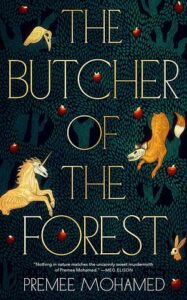
The Butcher of the Forest
Genres: Fantasy Pages: 160
Rating: 
Synopsis: At the northern edge of a land ruled by a monstrous, foreign tyrant lies the wild forest known as the Elmever. The villagers know better than to let their children go near—once someone goes in, they never come back out.
No one knows the strange and terrifying traps of the Elmever better than Veris Thorn, the only person to ever rescue a child from the forest many years ago. When the Tyrant’s two young children go missing, Veris is commanded to enter the forest once more and bring them home safe.
Received to review via Netgalley
The main character of this novella, Veris, once went into the forest to save a child. It’s no ordinary forest, and her journey is the only time anyone has been known to be successful in entering and leaving the forest, let alone bringing a lost child back. When the local Tyrant’s children go missing, he has her brought to him: she must go and retrieve his children, or he will kill her family.
Well, what choice does she have? It’s an interesting set-up, since she’s a middle-aged protagonist, and she’s full of aches and pains as she makes her way into the forest — and she’s no great witch, holds no great power to find her way, just a bit of knowledge and some luck. And the luck’s tenuous.
It’s a genuinely creepy story in that tense sort of way, with a lot of blank spots at the edge of the canvas of things we don’t really get to see/understand. The focus is on Veris’ journey, and her efforts to find the children, despite the sense that there’s so much more going on.
I found it enjoyable, though I’m still sort of letting it settle.
Rating: 4/5
Tags: book reviews, books, Premee Mohamed, SF/F
Posted October 24, 2023 by Nicky in Reviews / 0 Comments
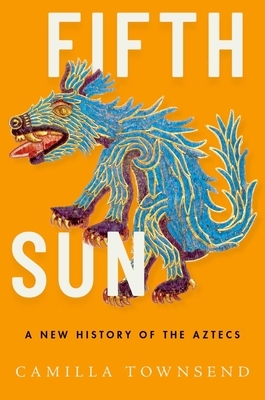
Fifth Sun: A New History of the Aztecs
Pages: 336
Rating: 
Synopsis: In November 1519, Hernán Cortés walked along a causeway leading to the capital of the Aztec kingdom and came face to face with Moctezuma. That story -- and the story of what happened afterwards -- has been told many times, but always following the narrative offered by the Spaniards. After all, we have been taught, it was the Europeans who held the pens. But the Native Americans were intrigued by the Roman alphabet and, unbeknownst to the newcomers, they used it to write detailed histories in their own language of Nahuatl. Until recently, these sources remained obscure, only partially translated, and rarely consulted by scholars.
For the first time, in Fifth Sun, the history of the Aztecs is offered in all its complexity based solely on the texts written by the indigenous people themselves. Camilla Townsend presents an accessible and humanized depiction of these native Mexicans, rather than seeing them as the exotic, bloody figures of European stereotypes. The conquest, in this work, is neither an apocalyptic moment, nor an origin story launching Mexicans into existence. The Mexica people had a history of their own long before the Europeans arrived and did not simply capitulate to Spanish culture and colonization. Instead, they realigned their political allegiances, accommodated new obligations, adopted new technologies, and endured.
Fifth Sun is a version of “Aztec” history which attempts to look beyond the traditionally-preferred Spanish sources to the sources written by indigenous people, as close as possible to the time events actually occurred. And it turns out that these sources actually have quite a bit to say, and some light to shed on common myths and beliefs. (Like the persistent belief that Moctezuma believed Cortes to be a god.)
Despite the author’s best efforts, I found the switching back and forth between the translated names and the untranslated names pretty confusing — in part due to unfamiliarity, giving my brain not that much to hang onto. I did appreciate the pronunciation guides though! Overall, partly because of that, I found it a bit slower and harder to follow than I’d hoped.
Nonetheless, it’s worth it; I feel like it’s closer than most popular history works to actually invoking what indigenous people thought and felt at the time. Townsend does a bit of “she must have sympathised with him” and so on where I rather wondered why on earth we should take that for granted given the circumstances, but I always find that irritating and it’s pretty rife in popular history in general.
Rating: 3/5
Tags: book reviews, books, Camilla Townsend, history, non-fiction













